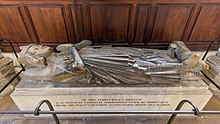Rollo (Normandy)


Rollo (to: Hrólfr or Göngu-Hrólfr) (* 846 ; † 931 or 932 ) is the Franconian - Latin name of a Viking who commanded the last great raid of the Vikings on western France in 911 . The later Icelandic sagas identify him with Hrolf Ganger (also called Gånge Rolf in Scandinavia ), but this assignment is now considered uncertain. Dudo de Saint-Quentin thought he was a Dane . This statement carries weight because his informant Raoul d'Ivry , a half brother of Norman Duke I. Richard was. He also came from England with a Danish contingent.
Allegedly, his name Rollo der Geher comes from the fact that because of his height a horse could not carry him and he therefore had to walk the entire overland route from Scandinavia to Western France. Possibly this should explain why Rollo was given the area, although he only called himself Primus inter pares and was actually not even a tribal prince. However, excavations show that horses in Scandinavia at that time only had a height at the withers of about 1.1 to 1.3 m.
He signed the Treaty of Saint-Clair-sur-Epte with Charles the Simple in 911 . Rollo was baptized and has called himself Robert ever since. After the baptism he received an area on the lower reaches of the Seine as a fief . Flodoard von Reims , who was close in time to the events, does not name him. Rather, he is referred to there as "princeps Normannorum".
The county of Rouen is the origin of today's Normandy . Rollo's first marriage was to Poppa von Bayeux . With her he had a daughter, Adele , Duchess of Poitou, and a son, Wilhelm (900–942). In a lament for his death it is said that he was conceived by a “transmarinus pater” (a father from across the sea) in “errore paganorum permanente” (in a permanent pagan error). The chronicler Richer von Reims (888–995) describes him as "dux Rollo, fili Catilli" (Duke Rollo, son of Catillus), a leader of pirates ("pyratae") who devastated Neustria and the Loire region. In a translation report from this period, he and his Vikings are portrayed as greedy and cruel, they are also accused of torture .
In his second marriage he is said to have married Gisela, a daughter of Charlemagne. After his death he was buried in the cathedral of Rouen .
His successors called themselves dukes of Normandy and were integrated into the Christian feudal system of the former France . Its guidelines later provided the legal basis for the conquest of England by a successor to Rollos. Rollo is a direct ancestor of Wilhelm the Conqueror (1027-1087).
Adaptation in literature and film
Rollo is one of the main characters in the 2013 Canadian-Irish television series Vikings . Rollo, played by Clive Standen , is the brother of the focus Ragnar Lodbrok . In the non-historical series, the relationship with his brother is discussed.
In the comic series "Les Chroniques barbaren" (German: Chronicle of the barbarians) by Jean-Yves Mitton , the conclusion of a contract of Saint-Clair-sur-Epte is released in Volume II, "La Loi des Vikings" (German: The Viking Law) interpreted.
In several of the songs of the music band Torfrock the figure “Rollo der Wikinger” appears, but in their texts it is located in the Schleswig-Holstein archaeologically developed Viking settlement Haithabu . The best-known song titles are "Rollo the Vikings", "Rollos Baptism", "Rollos Wampe" and "Volle Granate, Renate".
literature
- Claus Krag: Vikingtid og Rikssamling 800–1130 . Aschehougs Norges Historie, Vol. 2. Oslo 1995
- Horst Zettel: The image of the Normans and the Normans invasions in West Franconian, East Franconian and Anglo-Saxon sources from the 8th to 11th centuries. Munich 1977, ISBN 3-7705-1327-4
Web links
Individual evidence
- ^ Bertelsmann Lexikon in 15 volumes, Volume 12, Page 248, Gütherloh 1993 H, ISBN 3-570-03892-0
- ↑ Claus Krag: Vikingtid og Rikssamling 800–1130 . Aschehougs Norges Historie, Vol. 2. Oslo 1995, p. 18
- ↑ a b Horst Zettel: The image of the Normans and the Norman incursions in West Franconian, East Franconian and Anglo-Saxon sources from the 8th to 11th centuries. Munich 1977, p. 287
- ↑ Robert von Torigni to the year 912: "Karolus filiam suam nomine Gislam"; in: Léopold Delisle (ed.): Chronique de Robert de Torigni, abbé de Mont-Saint-Michel , Rouen 1872. The information is not very credible because Karl married for the first time in 907 and Gisla was the fourth of his born between 908 and 916 was six daughters from this marriage. The Chronico Rotomagensi Following died blinds wife Gisla (without specifying who her father) in the year 913, Chronico Rotomagensi 913 RHGF IX, p. 88. In this tradition occurs Bayeux not as the origin Poppas.
| predecessor | Office | successor |
|---|---|---|
| - |
Duke of Normandy 911-927 |
Wilhelm I. long sword |
| personal data | |
|---|---|
| SURNAME | Roller blind |
| ALTERNATIVE NAMES | Hrolf Ganger; Gånge Rolf |
| BRIEF DESCRIPTION | Vikings |
| DATE OF BIRTH | 846 |
| DATE OF DEATH | 931 or 932 |